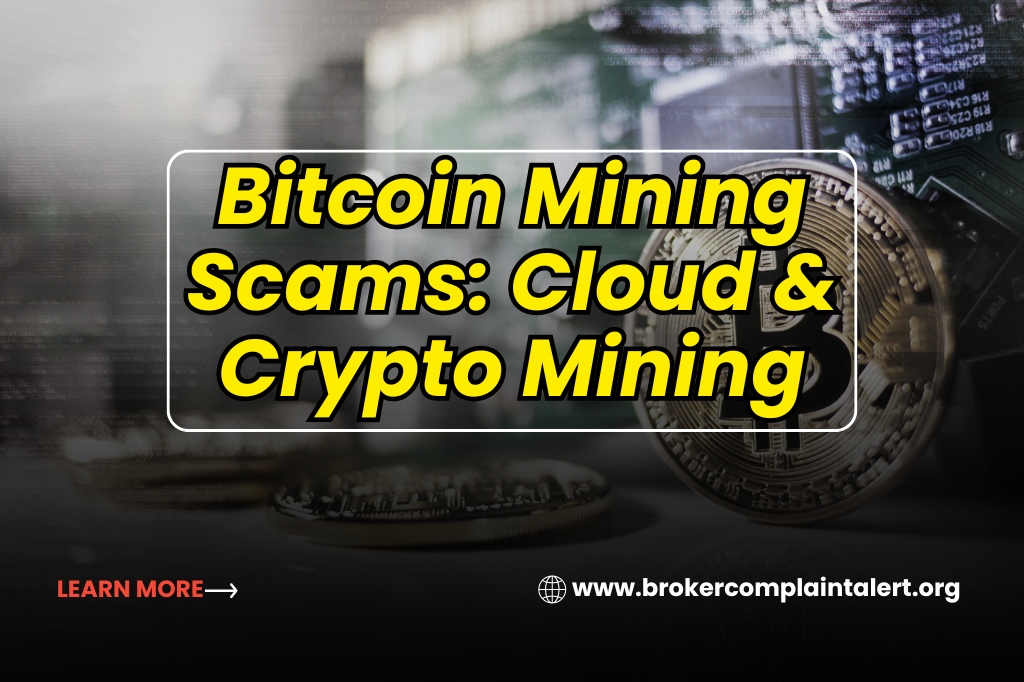Bitcoin mining is an essential process that ensures the security and decentralization of the Bitcoin network. Miners are individuals or entities that use powerful computers to solve complex mathematical problems, validating transactions and adding them to the blockchain.
In return, they are rewarded with newly minted bitcoins. As the popularity of Bitcoin has grown, so has the interest in mining. However, not everyone can afford the expensive hardware and energy costs associated with traditional mining.
This has led to the rise of cloud mining services, where users can rent mining power from remote data centers. Unfortunately, the increasing demand for cloud mining has also attracted scammers, leading to a surge in Bitcoin mining scams.
This article will explore the different types of Bitcoin mining scams, how to identify them, and what steps you can take to protect yourself. We will also introduce you to Broker Complaint Alert, a service dedicated to helping victims of cryptocurrency scams recover their lost funds.
Understanding Bitcoin Mining
Bitcoin mining involves the use of specialized hardware, known as ASICs (Application-Specific Integrated Circuits), to solve cryptographic puzzles. These puzzles are part of the process of verifying Bitcoin transactions and securing the network.
Miners compete to solve these puzzles, and the first one to do so adds a new block to the blockchain and receives a reward in the form of bitcoins. This process is energy-intensive and requires significant computational power.
For those who cannot afford the equipment or electricity costs, cloud mining offers an alternative. Cloud mining companies allow users to rent mining power from their data centers in exchange for a fee.
The idea is that you can earn bitcoins without having to manage the hardware or deal with the associated costs. However, not all cloud mining services are legitimate. Scammers have created fake cloud mining platforms to take advantage of unsuspecting investors.
Common Types of Bitcoin Mining Scams
Cloud Mining Scams
One of the most prevalent forms of Bitcoin mining scams is the cloud mining scam. In these scams, fraudsters set up websites that claim to offer cloud mining services. They promise high returns on investment and lure investors with the prospect of passive income.
However, once the money is invested, the platform either stops paying out or disappears entirely, leaving investors with nothing.
A classic example is the case of BitClub Network, a large-scale Ponzi scheme disguised as a cloud mining operation. The platform attracted thousands of investors with promises of guaranteed returns but was later revealed to be a scam.
The operators of BitClub Network were eventually arrested, but not before they had defrauded investors of millions of dollars.
Ponzi Schemes in Mining
Another common scam in the Bitcoin mining space is the Ponzi scheme. In these schemes, the operators use funds from new investors to pay returns to earlier investors, creating the illusion of a profitable mining operation.
However, as with all Ponzi schemes, they eventually collapse when the flow of new investors dries up, leaving the majority of participants with significant losses.
One such example is MiningMax, a supposed mining company that promised high returns but was, in reality, a Ponzi scheme. The operators of MiningMax were able to scam investors out of more than $250 million before the scheme was shut down by authorities.
Fake Mining Hardware
Scammers also prey on those interested in setting up their own mining rigs by selling fake or faulty mining hardware. These scams involve the sale of non-existent or substandard ASIC miners.
Victims are often drawn in by low prices or special offers, only to receive nothing in return or to receive hardware that does not work as advertised.
A well-known example is the case of HashFast Technologies, a company that took pre-orders for high-performance ASIC miners but failed to deliver the promised equipment to many of its customers. The company eventually went bankrupt, leaving many customers out of pocket.
If you have lost money to companies like Elitetradefx.pro or Wiseprofits.biz; please report it to us on our Report a Scam form.
Red Flags to Identify Mining Scams
There are several red flags that can help you identify potential Bitcoin mining scams:
- Unrealistic Returns on Investment: Be wary of platforms that promise guaranteed or unusually high returns on investment. In the world of Bitcoin mining, returns are never guaranteed due to the fluctuating nature of the cryptocurrency market.
- Lack of Transparency: Legitimate mining companies should provide detailed information about their operations, including the location of their data centers, the type of hardware they use, and the identities of their team members. If a company is vague or secretive about these details, it could be a scam.
- Absence of User Reviews or Negative Feedback: Before investing, it’s essential to research the platform. If you find little to no user reviews or come across multiple negative reviews and scam reports, it’s best to avoid the platform.
Real-Life Case Studies
Several high-profile Bitcoin mining scams have made headlines over the years, highlighting the need for caution in this space. For instance, the BitClub Network scam defrauded investors of over $722 million by pretending to operate a legitimate cloud mining service.
Similarly, MiningMax used a Ponzi scheme model to deceive investors, promising them high returns from a non-existent mining operation.
These cases illustrate the devastating impact these scams can have on individuals and the broader cryptocurrency community. Victims often lose their entire investments, and the reputation of the cryptocurrency industry suffers as a result.
How to Protect Yourself from Mining Scams?
Protecting yourself from Bitcoin mining scams requires due diligence and skepticism. Here are some steps you can take:
- Conduct Thorough Research: Before investing in any mining platform, take the time to research the company. Look for reviews, check if they are registered and regulated, and verify the authenticity of their claims.
- Verify the Legitimacy of the Company: Legitimate companies will have a track record, transparent operations, and verifiable information. Be wary of companies that cannot provide proof of their mining activities or that make it difficult to verify their legitimacy.
- Report Suspicious Activities: If you suspect that you have encountered a scam, report it to relevant authorities and platforms that can assist in investigating and potentially recovering your funds.
Broker Complaint Alert: Your Partner in Recovery
If you have fallen victim to a Bitcoin mining scam, Broker Complaint Alert can be a valuable resource in helping you recover your lost funds. Broker Complaint Alert specializes in assisting individuals who have been scammed by fraudulent cryptocurrency operations, including mining scams.
They offer a range of services, including free consultations, where they assess your case and provide advice on the best course of action. They also offer recovery service recommendations to help you navigate the process of reclaiming your lost funds. Additionally, Broker Complaint Alert provides professional guidance throughout the recovery process, ensuring that you have the support you need every step of the way.
Beyond recovery services, Broker Complaint Alert also offers educational blogs and materials to help individuals stay informed about the latest scams and how to protect themselves. By staying educated and vigilant, you can reduce the risk of falling victim to future scams.
If you have been affected by a Bitcoin mining scam, don’t hesitate to reach out to Broker Complaint Alert for assistance. Their expertise and commitment to helping victims can make a significant difference in your recovery journey.
Conclusion
Bitcoin mining can be a lucrative venture, but it’s also a space rife with scams. From cloud mining scams to Ponzi schemes and fake hardware sales, the potential for fraud is high. It’s essential to approach any investment in this space with caution, conducting thorough research and staying alert to red flags.
If you do fall victim to a scam, remember that help is available. Broker Complaint Alert is a trusted resource for those seeking to recover their lost funds and gain valuable insights into avoiding future scams. By staying informed and vigilant, you can protect yourself and your investments in the ever-evolving world of cryptocurrency.


